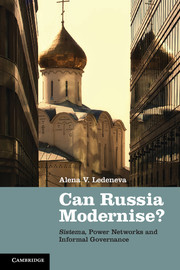Book contents
- Frontmatter
- Contents
- List of figures
- List of tables
- List of boxes
- Acknowledgements
- List of abbreviations and acronyms
- Introduction: modernising sistema
- 1 What is sistema?
- 2 Putin's sistema: svoi on top
- 3 The inner workings of sistema: from blat to otkat
- 4 Sistema's material culture: from vertushka to Vertu
- 5 ‘Telephone justice’ in the global age: from commands to signals
- 6 ‘Werewolves in epaulets’: from doublethink to doubledeed
- 7 From dealership to leadership: sistema and informal governance
- Conclusion
- Appendix 1 Survey questions
- Appendix 2 Interview questions
- Appendix 3 List of interviews
- Glossary
- Bibliography
- Index
- References
7 - From dealership to leadership: sistema and informal governance
Published online by Cambridge University Press: 05 February 2013
- Frontmatter
- Contents
- List of figures
- List of tables
- List of boxes
- Acknowledgements
- List of abbreviations and acronyms
- Introduction: modernising sistema
- 1 What is sistema?
- 2 Putin's sistema: svoi on top
- 3 The inner workings of sistema: from blat to otkat
- 4 Sistema's material culture: from vertushka to Vertu
- 5 ‘Telephone justice’ in the global age: from commands to signals
- 6 ‘Werewolves in epaulets’: from doublethink to doubledeed
- 7 From dealership to leadership: sistema and informal governance
- Conclusion
- Appendix 1 Survey questions
- Appendix 2 Interview questions
- Appendix 3 List of interviews
- Glossary
- Bibliography
- Index
- References
Summary
Informal leadership
Research into how leaders rule and manage Russia is vast, but evidence of the informal ways of getting things done at the leadership level is fairly scarce. It is not that power networks, unwritten rules, double standards, multiple moralities and forms of self-deception, played out in the field of informal politics, are not applicable to the leadership level, but they are rather difficult to research. In this chapter, I explore the ways in which reliance on power networks and instruments of informal governance affects leadership style. In order to exercise leadership, the official has to become an experienced broker of sistema, to stay in control of power networks, monitor their dynamics and use the instruments of informal governance. Leadership implies a combination of methods applicable in official hierarchical contexts and those applicable to unofficial power networks, which often seamlessly transform into each other. The literature on informal governance is somewhat limited, whereas leadership theories tend to examine practices of informal management under the rubric of interpersonal skills, rather than associate them with the nature of the organisation.
Similar to the daily use of networks for getting things done, the use of power networks in government jobs is taken for granted and often misrecognised. (Putin's use of power networks and reliance on informal governance is part of folklore.) The purpose of this chapter is to make informal governance an explicit part of the leadership story, to articulate and account for the instruments of informal management, so that they can be reflected upon by those who use them and those to whom they are applied. I argue that issues of informal governance deserve more systematic and in-depth analysis.
- Type
- Chapter
- Information
- Can Russia Modernise?Sistema, Power Networks and Informal Governance, pp. 211 - 243Publisher: Cambridge University PressPrint publication year: 2013

